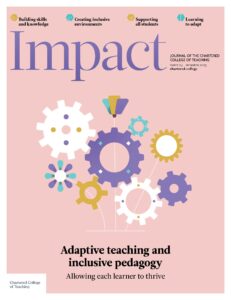SARAH COTTINGHATT, RESEARCH LEAD, STEPLAB, UK; PROFESSIONAL DEVELOPMENT CONSULTANT, AUTHOR AND COACH
ADAM KOHLBECK FCCT, DEPUTY HEADTEACHER; CO-FOUNDER, EDUPULSE, UK
CHRIS PASSEY FCCT, DEPUTY HEADTEACHER; CO-FOUNDER, EDUPULSE, UK
Instructional coaching, a form of professional development, may be a strong bet for schools (Sims, 2019). While there is debate about the definition, for the purposes of this article, we broadly define it thus:
Instructional coaching involves one teacher working with another teacher, to help them take small, personalised steps to improve their practice.
Mccrea, 2024
In part, the benefits may derive from the fact that instructional coaching is a natural fit for many mechanisms that appear to drive change in teacher practice, such as goal-setting, modelling, rehearsal and action planning (Sims et al., 2021). These mechanisms, most of which are drawn from the behavioural sciences (Michie et al., 2013), address a core aim of professional development: teac
Join us or sign in now to view the rest of this page
You're viewing this site as a guest, which only allows you to view a limited amount of content.
To view this page and get access to all our resources, join the Chartered College of Teaching (it's free for trainee teachers and half price for ECTs) or log in if you're already a member.












I really enjoyed reading this piece and it reminds me more broadly of the need for nuance in interpreting educational research and the importance of boundary conditions. Being an evidence-informed practitioner requires that perspective, and this important piece gives us ways of inculcating evidence-informed practice via the means of instructional coaching.